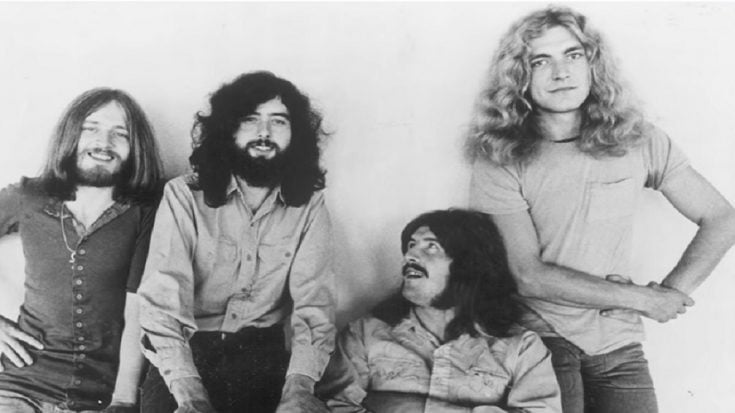Led Zeppelin Members Only Despised 5 Of Their Songs

via The Howard Stern Show / YouTube
For decades, Robert Plant has had a complicated relationship with Led Zeppelin’s iconic track “Stairway to Heaven”. Despite its popularity and status as one of rock’s greatest songs, Plant expressed feeling overwhelmed when listening to it in isolation.
He attributes this to the specific context in which it was written, a time marked by societal struggles and disillusionment. Compared to other artists who tackled similar themes more effectively, Plant feels “Stairway” falls short in its approach.
However, in October 2023, Plant surprised fans by performing the song for the first time in 16 years at a charity concert. This marked a rare exception to his recent distance from “Stairway”, further highlighting the complex nature of his feelings towards the song.
Interestingly, Plant’s bandmates also have mixed opinions on other Led Zeppelin classics. We’ll dive into five more Zeppelin songs that caused friction within the band, showcasing the diverse perspectives and creative tensions that contributed to their legendary sound.
“Whole Lotta Love” (1969)
“Whole Lotta Love”, with its iconic chug and swagger, is an inseparable part of Led Zeppelin’s legendary album Led Zeppelin II. But it’s not without its twists and turns.
Guitarist Jimmy Page despised the edited version of the song released as a single for AM radio, feeling it butchered the raw energy of the album version. He envisioned the whole album, including “Whole Lotta Love”, as a seamless experience meant for stereo FM to capture its full sonic depth.
Adding another layer of complexity, parts of the song were inspired by Willie Dixon’s “You Need Love”, recorded by Muddy Waters in 1962. This later led to a lawsuit by Dixon in 1985, resulting in him receiving song credits.
Despite the controversies, “Whole Lotta Love” soared, reaching No. 4 on the Billboard Hot 100 and propelling Led Zeppelin II to the top of the Billboard 200. While the song faced internal resistance and legal woes, its impact on both the band and rock music history remains undeniable.
“Living Loving Maid (She’s Just a Woman)” (1969)
Nestled on the flip side of the legendary “Whole Lotta Love”, Led Zeppelin’s “Living Loving Maid” might not be their most celebrated track. But the song, inspired by a persistent groupie who stalked the band in their early days, has carved its own unique space in their vast musical repertoire.
Despite co-writing the song, guitarist Jimmy Page wasn’t a huge fan of this track. Its bluesy swagger and suggestive lyrics likely differed from the direction he envisioned for the band. Nevertheless, the song has gained a cult following over the years, thanks to its raw energy and intriguing backstory.
“Living Loving Maid” never made it to a Led Zeppelin live show, leaving fans to experience it solely through recordings. However, its influence has lived on through covers by artists like Great White in the late 1990s and Train in 2016.
So, while “Living Loving Maid” might not be a stadium-filling anthem, its journey from B-side obscurity to cult classic status exemplifies the enduring power of Led Zeppelin’s music.
“D’yer Mak’er” (1973)
Led Zeppelin, known for their genre-bending rock anthems, took an unexpected turn on their fifth album, Houses of the Holy, with the track “D’yer Mak’er”. A playful reggae-infused song (clue’s in the song name) with nods to 1950s rock n’ roll, it was envisioned by guitarist Jimmy Page as a lighthearted experiment.
However, not everyone in the band was on board with the reggae detour. John Bonham and John Paul Jones, the rhythm section that fueled Led Zeppelin’s signature sound, found themselves uninspired by “D’yer Mak’er”. Bonham’s drumming, usually a force of thunderous energy, became a monotonous shuffle, dragging the song down with its repetitiveness.
“John was interested in everything except jazz and reggae,” Jones revealed in the 2001 book John Bonham: A Thunder of Drums. “He didn’t hate jazz, but he hated playing reggae. He thought it was really boring.”
“He wouldn’t play anything but the same shuffle beat all the way through it. It would have been all right if he had worked at the part, [but] he wouldn’t, so it sounded dreadful,” Jonesy added. Despite the internal friction and mixed reception, “D’yer Mak’er” remains a curious footnote in Led Zeppelin’s discography.
“Royal Orleans” (1976)
Led Zeppelin’s “Royal Orleans”, from their 1976 album Presence, boasts playful lyrics and a swaggering groove. Named after the New Orleans hotel where the band was staying, the song tells the story of a night gone awry, where a man ends up unknowingly going home with a “lady” who turns out to be a “boy”. The lyrics, sung with Plant’s signature rock growl, are largely comedic, filled with double entendres and playful teasing.
However, the song’s lighthearted tone masks a controversial element. Jones later expressed his discomfort with the track, calling it “homophobic”. He also revealed that another band member, whom he declined to name, had an encounter similar to the song’s plot, but didn’t take it lightly.
While some dismiss Jones’ criticism as an overreaction, others point to the historical context of LGBTQ+ acceptance and the potential harm caused by perpetuating such narratives.
Whether intended as harmless fun or harboring underlying prejudice, “Royal Orleans” remains a complex and contentious entry in Led Zeppelin’s catalog, prompting listeners to grapple with the line between playful mockery and offensive stereotyping.
“All My Love” (1979)
Led Zeppelin’s final album, In Through the Out Door, arrived in 1979 shrouded in darkness. It reflected the band’s struggles with internal discord, tax issues, and most tragically, the death of Plant’s young son Karac in 1977. The album title itself serves as a metaphor, referencing both their financial woes and the feeling of hitting a wall creatively.
Among the album’s tracks, “All My Love” stands out as a poignant moment of vulnerability. Written by Plant and Jonesy, the song departs from Led Zeppelin’s usual hard-driving rock with its delicate melody and orchestral flourishes.
Interestingly, Page and John Bonham weren’t fans of the song’s softer direction. They felt it strayed too far from Led Zeppelin’s signature sound, representing a side of the band they weren’t comfortable expressing.
In hindsight, “All My Love” serves as a bittersweet bridge between Led Zeppelin’s past and future. The song’s delicate beauty stands in stark contrast to the heavier themes surrounding the album, offering a glimmer of hope and a poignant tribute to lost love.
















